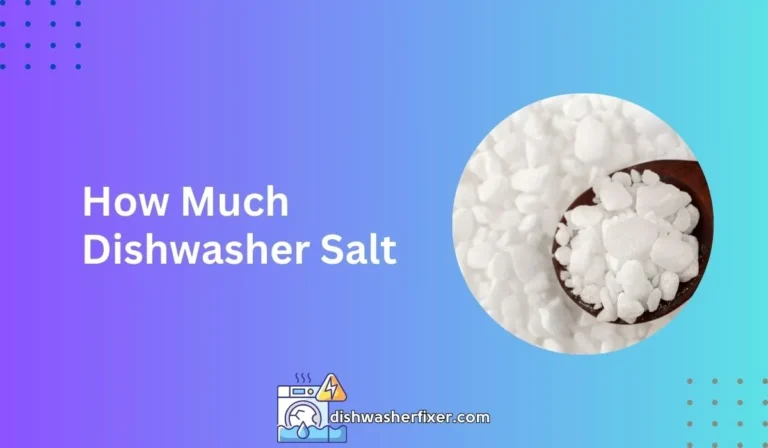Do Dishwashers Really Work? Debunking Myths & Facts!
Yes, dishwashers effectively clean dishes. They use hot water and detergent to remove food and grease, with cycles designed for different levels of soiling. Proper loading and maintenance ensure optimal performance, making them a convenient and efficient cleaning appliance.
The Mechanics of Dishwashers

Understanding How Dishwashers Clean
Dishwashers operate by spraying hot water mixed with detergent onto the dishes. This process begins with the appliance filling with water and heating it to the appropriate temperature.
Once the water is hot enough, the dishwasher pumps it through spray arms that distribute it evenly over the dishes. The combination of hot water and detergent works to break down food particles and grease, making it easier for them to be washed away.
Water Temperature’s Role in Cleaning
The effectiveness of dishwashers largely depends on water temperature. Hot water not only helps to dissolve detergent more effectively but also sanitizes the dishes by killing bacteria and other germs.
Most dishwashers have a built-in heating element that can raise water temperature to a point where it can clean more effectively than hand washing in lukewarm water.
Detergent Types and Their Functions
There are various types of dishwasher detergents available, including powders, liquids, and pods.
Each type is formulated to work optimally within the unique environment of a dishwasher. They contain enzymes and other cleaning agents that are activated by water to break down and remove stubborn food residue and stains.
The Crucial Role of Spray Arms and Jets
The spray arms and jets in a dishwasher are designed to reach every corner of the machine, ensuring that all dishes come into contact with the detergent-laden water.
The forceful spray helps to remove food particles and rinse the dishes thoroughly. It’s essential for the spray arms and jets to function correctly to avoid any spots or leftover residue on the dishes.
Optimizing Cleaning with Dishwasher Cycles and Settings
Dishwashers come with various cycles and settings to handle different levels of soil. From heavy-duty cycles for pots and pans to delicate settings for fine china, selecting the right cycle is key to achieving clean dishes.
Some dishwashers even have sensors to determine the level of dirt and adjust the cycle accordingly, ensuring optimal cleaning every time.
Advantages and Limitations of Using Dishwashers

Comparing Dishwashers to Hand Washing
Studies have shown that dishwashers can clean dishes more effectively than hand washing.
The high temperatures and mechanical action of a dishwasher can remove more bacteria and food residue than washing dishes by hand in a sink. This not only results in cleaner dishes but also a more hygienic kitchen.
The Time-Saving Benefits of Dishwashers
Using a dishwasher saves significant time compared to hand washing. Loading and unloading a dishwasher takes a fraction of the time required to scrub dishes by hand, not to mention the additional time saved by not having to dry the dishes afterward.
Analyzing Energy and Water Usage
Dishwashers can be more energy and water-efficient than hand washing if used correctly.
Modern dishwashers are designed to use less water per cycle than filling up a kitchen sink, and the energy used to heat the water is often less than what would be required to heat the same amount on a stove or in a tankless water system.
Environmental Impact of Dishwashers
When it comes to environmental impact, dishwashers can be a more sustainable option than hand washing.
They not only use less water but also have filters to reduce the amount of waste entering the drainage system. Energy-efficient models further minimize the carbon footprint of cleaning dishes.
Dishwasher Safe Dishes and Cookware
Most dishes and cookware are dishwasher safe, but it is essential to check the manufacturer’s recommendations.
Items made of certain materials, such as aluminum or non-stick coatings, may not be suited for the high heat and harsh detergents used in dishwashers.
When Dishwashers May Fall Short
There are instances when dishwashers may not be as effective, such as with heavily soiled pots and pans or items with dried-on food. In these cases, pre-rinsing or even hand washing may be necessary to ensure the dishes come out clean.
Enhancing Dishwasher Performance

Best Practices for Loading a Dishwasher
Proper loading is crucial for dishwasher performance. Plates should be spaced apart and angled to allow water to reach all surfaces.
Cups and bowls should be placed on the top rack, and larger items should not block the spray arms’ paths. It is also important to ensure that utensils are not nested together.
Maintenance Tips for Optimal Performance
Regular maintenance is essential to keep a dishwasher running smoothly. This includes cleaning the filter, checking the spray arms for clogs, and using a dishwasher cleaner to remove any buildup inside the machine.
Keeping the seals clean and intact also prevents leaks and extends the life of the appliance.
Dealing with Hard Water
Hard water can affect a dishwasher’s efficiency by leaving deposits on dishes and the interior of the machine. Using a water softener or adding a rinse aid designed for hard water can help mitigate these effects and keep dishes spot-free.
Choosing Detergents and Additives
Selecting the right detergent and additives is important for dishwasher performance.
Some detergents are specifically formulated for hard water, while others are designed to work at lower temperatures. Rinse aids can also help by reducing water spots and ensuring that dishes dry properly.
Troubleshooting Common Issues
If a dishwasher is not performing as expected, troubleshooting can often resolve common issues.
Checking for clogs, ensuring that the dishwasher is level, and inspecting the door seal for leaks are all quick fixes that can improve performance. If problems persist, consulting the owner’s manual or contacting a professional may be necessary.
FAQs About Dishwasher Effectiveness
Do dishwashers clean dishes as well as hand washing?
Yes, dishwashers can clean dishes as well as or even better than hand washing, especially if they are loaded properly and maintained regularly.
Are dishwashers efficient at removing tough food and grease?
Yes, dishwashers are designed with cycles to tackle different levels of soiling, including tough food and grease, using hot water and detergent.
What is the importance of loading a dishwasher correctly?
Loading a dishwasher correctly ensures optimal cleaning by allowing water and detergent to reach all surfaces of the dishes.
How often should a dishwasher be maintained for best performance?
Regular maintenance, such as cleaning the filter and inspecting the spray arms, should be performed according to the manufacturer’s recommendations to ensure best performance.
Can I use regular detergent in my dishwasher?
No, you should use detergents specifically designed for dishwashers, as regular detergents can cause damage and affect cleaning performance.
Final Thoughts
Dishwashers are proven to be effective in cleaning dishes, leveraging hot water and detergent to tackle food remnants and grease.
Their various cycles cater to differing levels of dirtiness, and when combined with proper loading techniques and regular maintenance, these appliances offer a convenient and efficient solution for dish cleaning.





